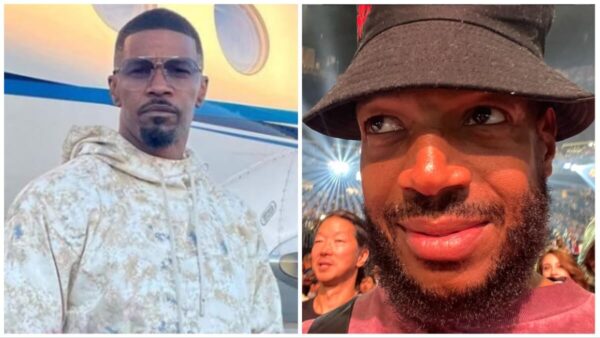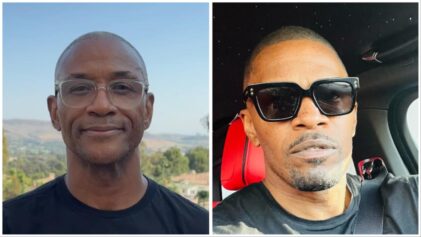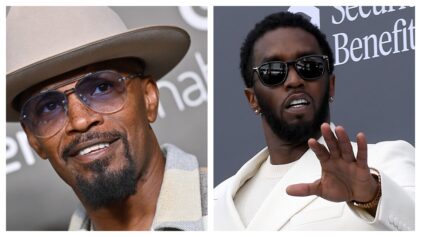Actors Jamie Foxx and Marlon Wayans have both been under scrutiny over the past week due to various posts shared on their social media platforms. Many deemed each post as “offensive” toward different audiences. But the rhetoric of what they said is not as important as how it was portrayed to the media and others online.

Jamie Foxx shared a cryptic post about betrayal using the hashtags #fakefriends and #fakelove. “They killed this dude named Jesus what do you think they will do to you,” he wrote.
It appeared to be unprovoked but those two hashtags, along with the Jesus mention, prompted many online users and some media outlets to refer to the post as a “horrifically antisemtic message.”
The backlash prompted the Academy Award winner to delete the post and apologize to folks who accused him of speaking ill of the Jewish community. However, Foxx clarified that he was only speaking about the betrayal of a fake friend.
Actress Jennifer Anniston seemingly engaged with the post, which led his supporters to accuse her of attempting to tarnish Foxx’s reputation.
The polarizing controversy has garnered responses from many, including right-wing talking head Candance Owens. She claims the “Friends” star issued “an apology for something she never did,” while Foxx “obviously immediately folded under pressure.”
Minnesota Rep. Ilhan Omar also felt the pressure to apologize in 2019 after being falsely accused of using anti-Semitic tropes to criticize Israel and its U.S. supporters. She insisted that her criticism of Israeli policy doesn’t make her anti-Semitic despite how others feel.
For most celebrities, having any type of connection to anti-Semitism or remarks that many deem anti-semitic can be damaging to one’s career and livelihood. “Wild ‘N Out” creator Nick Cannon went on an apology tour and was ultimately fired by ViacomCBS, which happens to own many of the networks he’s worked with thus far in his career.
During a 2020 episode of his YouTube series, “Cannon’s Class,” he was joined by former Public Enemy member Richard Griffin, famously known as Professor Griff. The two had a discussion about conspiracy theories, and Griffin claimed that Jewish people controlled most major media companies – a claim that even Charlamagne Tha God of “The Breakfast Club” agreed with.
Meanwhile, others like Kanye West have been accused of anti-Semitic abuse due to repeated remarks about Jewish people in social media posts, interviews, podcasts, and public appearances.
The controversy cost West deals with Balenciaga, Gap, Foot Locker, and more brands that cut ties with him, bringing his net worth down drastically from $2 billion to $500 million. Ye, the rapper, also lost his $1.5 billion partnership deal with Adidas.
Like Cannon, West has issued an apology or two, but his random outburst ultimately led his Twitter account to be suspended for numerous reasons.
Fans are known to scratch their heads when celebrities stick their foot in their own mouth. Just as Marlon Wayans appears to have done.
For the past few days, Wayans has been slammed by social media users who seemingly accused him of criticizing the Black folks who helped defend a Black security who was jumped by a white mob at a Riverfront in Alabama. He quoted lyrics and posted audio from “Try That In a Small Town” by country singer Jason Aldean, attached to two Instagram videos of the incident.
The song’s video was recently pulled from Country Music Television, which obtained images from the 2020 summer riots and protests that took place following George Floyd’s death. The song itself has been condemned for its “heinous” and offensive lyrics, which many deemed as “Black Lives Matter diss.”
The first post Wayans’ shared featured a clip of three men retaliating against a few of the mob who attacked a Black boat employee. How ‘bout we NOT “try that in a small town”…. Sh*t silly bro… let’s all just be love NOT war,” he wrote in the caption.
After being accused of condemning the Black folks who helped the boat employee, Wayans shared a second post featuring the beginning of the altercation, which began with a white man attacking the boat security guard and two other white individuals who joined in. “Y’all must got me f-cked up… here! Now stfu,” he captioned the video.
But some Black folks are wondering, “Why you cursing at us?” Many online have been rejoicing after watching dozens of viral clips and angles of other Black folks swimming across water and jumping over railings to help one of their own.
The culture knew Foxx’s post was simply about betrayal and disloyal friends, nothing more than that. However, Wayans’ posts were a bit misleading as many couldn’t tell if he was siding with the white mob who attacked a Black man or if he was being sarcastic.
“And why would I criticize Black people for defending themselves? That’s the thing about social media man it’s up for interpretation. Y’all tripping,” said Wayans in response to the backlash. “Black people know I love Black people. I’m Black.”
He added that his posts were “misinterpreted” because “Nobody knows irony no more huh. Guess that just went out the window. It’s the irony of the song.”
“I love you bro but you didnt really say much with the posts which left alottt of room for interpretation.”
“You tried to make it seem like both sides were out of line! Nothing that you posted was in defense of those black people! Don’t try to straddle the fence! Self defense is NEVER silly!”
“The fact that u even had to address this is WILD! I mean, what/who blacker than Wayans Fam… We love EVERYBODY, esp our people! If ILC was on today there’s enough of us that would’ve been in the sketch reacting the Avengers treatment the other side got… I would’ve played the guy that swam over, Indeed!”
“Chile they didn’t catch the sarcasm. Have to spell it out through texts as much as possible so hard to decipher tone these days. And they loove to run with the bad stuff first.”
“I guess they really found out that small town song goes both ways down in Alabama. The spirit of MLK was nowhere to be found in 2023, all I saw was Malcolm X and it was necessary.”
In addition to memes of Malcolm X, Harriet Tubman, Martin Luther King, Jr., and other Black leaders smiling over Black unity have taken over social media.
For some, Foxx’s apology is being viewed as an accountability moment to say sorry for offending someone, but it wasn’t a direct apology for any wrongdoing. Others believe he apologized out of fear of his reputation being damaged as one of the most high-profile actors in Hollywood.
Owens immediately jumped to Foxx’s defense, stating that she wished he didn’t apologize “because it’s not what he meant when he said it.”
Why Foxx took the serious approach is unknown, but Wayans’ comical yet aggressive approach was met with a bit more backlash. Their posts were misunderstood and taken out of context, and they began to make others question the way Black folks talk to each other.
It can be inferred that Foxx’s soft apology was for white audiences, while the standup comic called out Black folks for not knowing or understanding what he was talking about.
As a comedian, he said he uses humor to cope with any negativity or the hardships of everyday life. Clearly, his remarks did not connect with everyone the way he intended them to. He had hoped that many, including the Black community, would appreciate him using humor to bring everyone together.
“Most of the people on social media with these [negative] opinions aren’t even real people,” he said in a recent interview. “They’re trying to strip us of the very thing that makes our country special: the freedom of speech.”
But some say the “White Chicks” actor did not take accountability for letting the minds wander before ostensibly explaining that he was being sarcastic.
But who does Marlon Wayans owe an apology to? The Black community or everyone as a whole?


